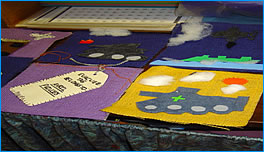 Focus on History
Focus on History
Quality of Learning
- Overall, the quality of learning in history is good and often very good.
- Pupils are enthusiastic learners in this subject whose knowledge and understanding of different periods, events and people in history is often outstanding. They enjoy being 'historical detectives' and ask appropriate questions often making informed judgements. One school has developed links with Cardiff Musuem and has enlisted the services of a curator to undertake investigations involving historical archaelogy in their locality.
- Cross curricular links with other subjects are very well developed. Most schools make use of theatre groups such as Theatre Nan Nog and the Chance Encounters Theatre Company for historical drama and role play. One school has received lottery funding for a local history project ('Then and Now') in association with the 'family learning initiative'. This has resulted in the production of a local history book for use in school and for members of the public.
- All schools make educational visits to places of historic interest. These visits are linked to topics being studied in school. Tasks are generally undertaken following the visit and are based on the schools scheme of work.
- In the best practice, schools make use of worksheets as 'writing frames' which enable pupils to produce some excellent examples of extended writing. In a number of schools however, too much emphasis is placed on the completion of a simple worksheet which does not allow children to develop ideas and express opinions.
- One very good feature observed in childrens written work involves children using the lesson objective as a heading/title for their work. Subsequently, teachers mark to this criteria with appropriate comments being made to promote learning.
- Children and teachers use the Internet confidently when researching historical information. Some useful websites used by schools include:
- One school has developed its own web page reporting on its local history project.
Quality of Teaching
- The quality of teaching is good and often very good in all schools visited. Teacher subject knowledge especially at primary level is an outstanding feature. This knowledge enables them to bring history 'alive' not only in local studies but also in wider, national aspects of history.
- There is strong evidence that primary teachers are enthusiastic local historians who enjoy teaching this aspect of the curriculum.
- Lessons observed were well planned and carefully structured with most schools following the LEA scheme of work including the curriculum maps/cycles and activity framework.
- All schools visited, planned carefully ensuring coverage of the five aspect of history i.e:
- chronological awareness
- knowledge and understanding
- interpretation
- enquiry
- organisation and communication
- Most schools make and maintain only the basic records of pupils' progress in history. However, a very good initiative used by one school involves developing a simple self-assessment system for pupils. This involves children writing for example five facts they know about a topic beforehand. After the topic, they revisit the list adding the knowledge since acquired. Some schools maintain written records which involve recording 'coverage' of the history curriculum for each child. This is often repetitions and unnecessary work
- An infant school maintains 'Assessment Level Records' for all pupils in all curriculum areas from nursery to Y2. Specific criteria is established for each year group. For Y2 pupils', teachers focus on whether pupils:
- begin to question why things happened in the past; and whether children
- are aware of ways to find out about the past.
Their records are transferred to the junior school at the end of the key stage.
- A number of schools make use of ACCAC optional test materials but generally this is underdeveloped.
- Teachers use a good range of resources in the history curriculum, much of it owned by the school or donated by members of the community and some on loan from museums and libraries.
- Almost all primary schools employ specialist staff from libraries and museums in supporting teaching and learning in their classes. Parents and governors are also invited to make contributions to pupils learning experiences in areas such as Victorian life, WWII and life in the 1950's.
- In the best practice observed, teachers marking comments are based upon lesson objectives and National Curriculum level descriptions. However this is not widely employed by schools. Marking is often focussed on what children have covered rather than their level of attainment.
- Despite constraints, subject leaders in history continue to maintain and develop moderated portfolios of work undertaken by pupils across the school. Few however, have had the opportunity to participate in recent INSET in this area of the curriculum.
| Continue: Transition in History |

